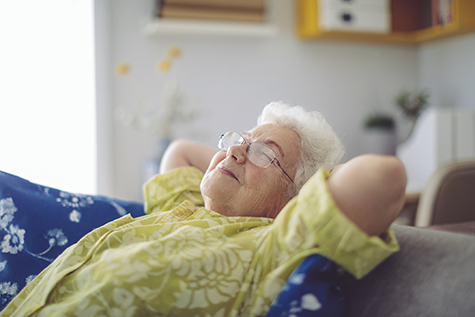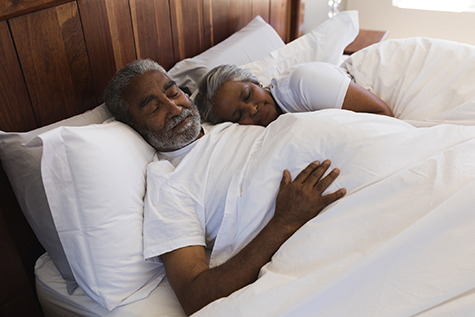Bones and Sleep: The Surprising Connection

If you’re a woman over 50, you may be experiencing one of the most common complaints of post-menopausal women, not being able to sleep as well as you used to. Not only does poor sleep affect your mood and energy levels, recent research now says it can seriously impact your bones. Here’s why…
Golden Girls Sleep Habits Ups Risk for Osteoporosis
If you’re a post menopausal woman having trouble sleeping at night, your bones could be facing a double whammy threat. A decrease in estrogen naturally puts you at higher risk for osteoporosis than men, even though men do get osteoporosis.
Now, for the double whammy. Researchers have recently determined that just the fact that you don’t sleep well adds even more risk to your plate. I know, just knowing that may make you worry more and sleep even less, right? But, take heart, there is a remedy to the situation. Let me tell you about it.
While you sleep at night, your body does all its repair work. You become like a biological “body shop” that comes alive during sleep. Every system, muscle, bone, tissue, and cell does their particular repair and rebuilding job.
During sleep, your bone cells turnover, regenerate, and grow new bone. So, it stands to reason that if you’re not sleeping well, or you’re not sleeping enough, your bones may not adequately be able to generate new bone tissue. Without new, strong bone tissue growth, your bones become weaker, movement becomes difficult and painful, and you’re more prone to dangerous fractures. It could even lead to premature death.
A study cited in the 2015 Journal of Bone and Mineral Research reported that poor sleep, particularly sleep apnea, can be a previously unrecognized cause of osteoporosis. The occurrence of osteoporosis in people with sleep apnea is 2.7 times higher, says a recent study in the Journal of Clinical Endocrinology and Metabolism.
With sleep apnea, your airway becomes partially, and sometimes completely, blocked as you sleep. Your tongue, or uvula, may fall back into your throat while you sleep reducing air flow. Deviated nasal septum, where one, or both, sides of your nasal passages are constricted; chronic nasal/sinus congestion; and even excess weight around your face and neck can all block airflow.
With blocked airflow, there is frequent pausing of breathing during sleep. Apnea means, literally, “without breath”. As a result, your oxygen levels drop down while sleeping. Less oxygen in your blood sets up an inflammatory condition throughout your body including your bones. Inflammation anywhere in your body sets the stage for disease to set in. In your bone cells, it creates an environment where your bone cells can’t grow into strong bone tissue.
How do you know you might have sleep apnea? Well, just being a post menopausal woman makes you more prone to sleep disturbances and sleep apnea. But, if your partner also complains that your snoring is keeping him/her awake, you likely have it. If you sleep alone, and find yourself waking up gasping for air, that’s another tell-tale sign.
Recent research cited in the European Respiratory Journal reported unusually high rates of sleep apnea in women in general. They also found high rates of severe sleep apnea in women ages 55-70, especially if they were overweight or had hypertension. Previously, pulmonary doctors thought sleep apnea was greater in older men.
Getting Evaluated for Sleep Apnea
If you’re experiencing poor sleep, snoring, or waking up gasping for air, it’s important for you to be evaluated for sleep apnea. You need to report your symptoms to your doctor who can schedule you for a diagnostic overnight PSG (polysomnogram). This is the most common type of sleep study. You can either spend the night in a special lab bedroom or do an at home sleep study.
In the lab version, you’ll have several little sensors applied to your face and scalp, much like the ones used in an EEG or EKG. You’ll also have a blood oxygen monitor applied to your finger. These sensors correspond to machines in the lab that are monitored by a technician.
You’ll go to sleep at your normal time. During that time, the lab technician will monitor your readings as you sleep. They record your sleep patterns, how fast you fell asleep, how well you sleep, your brain activity, your oxygen levels, and your degree of movement during sleep. When you wake in the morning, the technician will remove your sensors and you can go home. The lab technician will then process your sleep findings and let your doctor know if you have sleep apnea.
In the at-home sleep study (easiest and most comfortable), you’re given a simple device, which you wear to bed. The next day you return the device to the lab and your findings are evaluated and given to your doctor.
Your doctor can then determine the appropriate treatment for you. If your sleep apnea is caused by excess weight, your doctor will likely recommend a weight loss program.
If your sleep apnea is caused by a deviated septum, enlarged uvula, tongue, tonsils, or adenoids, surgery may be recommended. Your doctor may also order a device called a C-Pap, or BiPap, for you to use while you sleep. These allow you to get more oxygen while you sleep.
It’s important for you to learn if sleep apnea is at the heart of your poor sleep habits. It not only puts your bones at higher risk for osteoporosis, but the decreased oxygen levels also ups your risk for heart attack and stroke.

